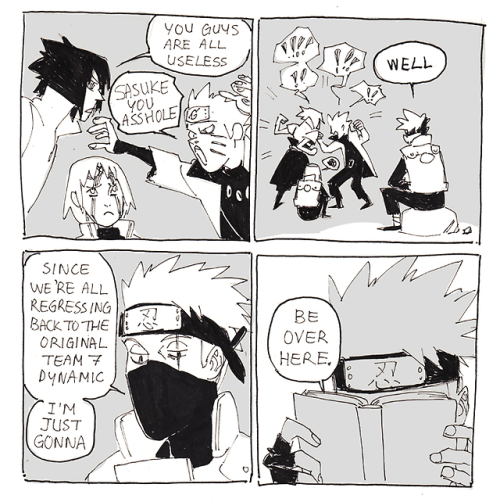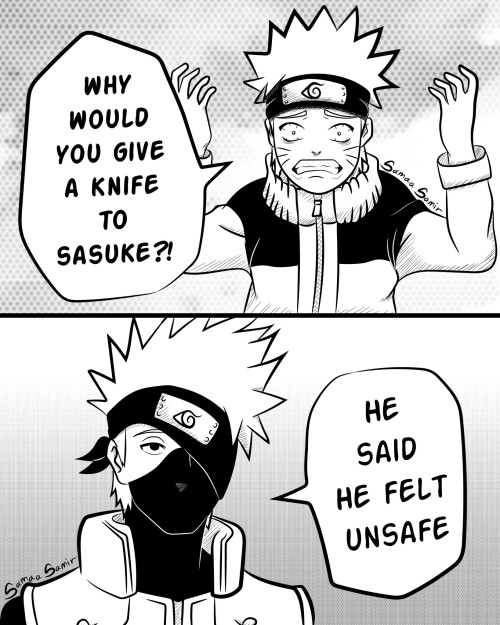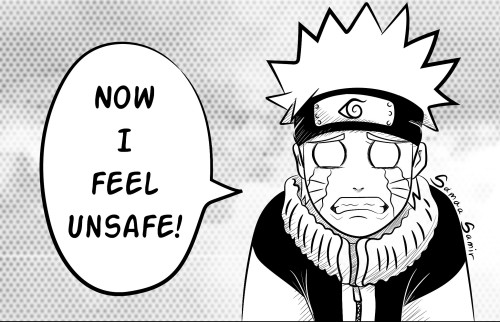This Was The Moment Where I Knew I Was A Goner.





this was the moment where i knew i was a goner.
i didn’t even LIKE this show back when i watched these episodes, and yet i specifically remember mumbling “oh my god” when i heard those steps on the porch and kakashi’s gentle voice saying can i talk to you.
the idea that this man would even take the time. kakashi met these people two days ago. he’s a total stranger to them. he’s not responsible for inari. he’s not a part of inari’s family. he’s a temporary employee, one who’s not even being paid for his work, thanks to tazuna’s lie. he has absolutely no reason to get involved when this tiny child has a meltdown at the dinner table - and yet.
out he goes onto the porch, after the crying child. the fact that he does this at all would be admirable enough in its own right, but it’s not just that. it’s the way he’s such a natural with children, the way he’s such an intuitively skilled teacher, the way he treats inari with the same kind of respect that he would afford to a fellow adult, while still addressing him in a way that a younger mind can easily understand. it’s the “can i talk to you” - giving this little child the autonomy to say no, instead of using the fact that one person is an adult and one is a child to force an interaction. it’s the way he always refers to kaiza as “your father,” even though inari and kaiza weren’t technically related (and even though the first thing tazuna says about kaiza is “he wasn’t [inari’s] real father”) - kakashi takes his cues from inari, and for inari, kaiza WAS his real father, and so that’s what kakashi calls him, every single time. it’s the way he acknowledges that what naruto said wasn’t very nice. it’s the way he gently explains the circumstances that might have prompted naruto to say something like that, opening inari’s eyes to how naruto and inari have experienced similar pains. and it’s the way he does all of this without giving away a single hint that his own childhood might have been anything other than perfectly pleasant - the complete decentering of the self, the mending of the children around him without them ever realizing a single thing about why he does it.
kakashi tells inari “i think [naruto] knows better than any of us what you’re going through” - and at the time when i was watching, i was like “sure, sounds legit!” but now, looking back, and armed with so much more information, i know the truth, which is that there’s someone in the room who understands inari even better than naruto. naruto grew up without parents, yes. but the story tazuna tells Team 7 isn’t about growing up alone and shunned as an orphan. it’s about inari having a father who he loved and revered (“the man who taught us the word courage, who was known as a hero”), and then having him be (literally, on an actual cross) crucified for standing up for what’s right (“this man has defied the gato corporation…he has disturbed the order of this land”), and then inari having a trauma-induced crisis and rejecting his father’s heroic ideals because they no longer feel real or possible to him (“since then, inari’s changed. so did tsunami, and all our people…we lost our will”), and then inari ripping his father’s face out of their family photo in the kitchen (“[inari] never laughs or smiles anymore. ever since that day when everything changed.”)
naruto and inari do end up connecting eventually, because kakashi helps them recognize where they have common ground. but the person at the table who really understands the crying child (the child who’s shouting “there’s no such thing as a hero!”) is kakashi. the person who really understands inari’s anger at being left behind - at having a beloved parent make a decision that takes them out of your life forever, when they could have just kept their heads down and stayed with you - is kakashi. the person who understands both inari’s rage at others’ idealism and his unwillingness to break gato’s rules as feelings that come from a place of fear (“gato’s got a whole army; he’ll beat you down and they’ll destroy you!”) is kakashi.
you told me that you’d protect me and this land with both your arms. you made me believe you could do it. but it was all just a lie!
kakashi understands. he knows, and just like always, he steps in to help. he sees a suffering child, and he knows he can do something about it, and he gets involved, even though he doesn’t have to, even though it’s not his job, even though there is literally no reason why he should be the one to comfort this kid when inari’s mother and grandfather are sitting right there in the same house. kakashi doesn’t do it because he’s obligated. he does it because he can’t NOT do it, because this is who he is, because this is how much he cares, because he’s the avatar for what jiraiya tells young!nagato in the pain arc: “it is because one understands such pain that generosity towards others becomes second nature.”
this scene with inari is in episode TWELVE. twelve, of one thousand. at this point in the show, we know nothing about kakashi. we have no idea what his life has been like. but this show still tells us exactly who he is, right then and there, when he walks out onto that porch and asks a stranger’s crying child “can i talk to you?” from that point on, we know - he’s The Teacher. he’s the one who walks ahead of everyone else, enduring his own pain and using it to help others navigate theirs. he’s the support structure. he’s the guide, the protector of children. it was true nine hundred episodes ago in the land of waves, and it’s true where i’m currently watching, too, in the shadow of the infinite tsukuyomi, when kakashi asks sasuke “what is your current dream?” - because never mind the war, never mind the three intervening years of conflict and bad blood, never mind the danger encroaching on all sides - kakashi is still kakashi. he’s still the one who sees a lost child and asks, “can i talk to you?”
i’m not sure he’ll get a response as positive as inari’s this time, or that he’ll get any response at all, but i think it matters to remember that nothing - nothing - has ever changed him from being the kind of person who asks this question.
More Posts from Anniespongebob and Others
what does the j stand for in anthony j. crowley? is it janthony?



pulls book out of ass
Nimona and the Myth of the Perfect Victim
Nimona is great at showcasing why “If you didn’t act so threatening people would stop being bigoted” doesn’t work. That idea has been rampant in social movements for so long, the concept that if oppressed people were just more passive with their wording, and never got angry or defensive, people wouldn’t have reason to oppress them.
When the village attacks her, Nimona doesn’t initially fight back, but tries to explain to them, showing them her “acceptable” form as a young girl.
But they don’t care that Nimona looks acceptable, they still know her for a shapeshifter and attack anyway. Then, when Nimona fights back with fangs and claws, Gloreth becomes convinced she is indeed a monster. Never mind the context of the provocation, Nimona looked scary, so is now a monster.
Far in the future, Nimona now doesn’t worry about looking respectable. Ballister tells them they should look like a girl, because it would be easier for to be accepted.
To many people, this would be valid reasoning - if Nimona assumes a non-threatening form, no one will be scared. But Nimona knows this isn’t true. If people catch sight of the shapeshifting even for a moment, it won’t matter that Nimona takes the form of a sweet, innocent girl. They will attack anyway.
And staying as a girl forever, never letting them see, is something she doesn’t see as an option. Other people might see it that way, that it is better to forever rigidly conceal their identity so they never once face any hatred, but as Nimona says, while it’s not true death, it sure isn’t living.
Earlier, Ballister was caught destroying the prison with Nimona, adding fuel to the idea of him as a villain, which he blames her for. But he was labeled as one anyway. Had Nimona not gotten him to wreak havoc, he would have remained in prison and never seen as innocent.
While Ballister initially believes that Nimona is ridiculous to dramatically break standards of acceptability, he realizes that some people won’t accept Nimona even if she is “the perfect victim.”
We see this in real life, where even someone who is the epitome of moral decency will still eventually be targeted. Illusions to the contrary are disproven.
Of course the city screams and runs when Nimona transforms into a giant creature, but they screamed and ran when he turned into non-threatening creatures as well. So Nimona is driven to view it as not mattering which she does. Of course, in the end she chooses to help them anyway, and calm herself from her giant form, because Ballister shows her recognition while she is in it.
Ballister sees her in her most terrifying form and recognizes she is lashing out from fear and anger at the treatment she received. He doesn’t demand she stop and be more respectable, he sees them as they truly are and shows them understanding, and that is what calms Nimona down.
There is no perfect victim. Everyone is messy and flawed and will lash out. If there were a perfect victim, it wouldn’t matter anyway. A perfect victim is one who never dares raise an arm against attack, even out of desperate self defense. Nimona would be a perfect victim if she had laid down and succumbed to the pitchforks. Ballister would be a perfect victim if he sat in prison to rot.
A “perfect victim” will always die before being being recognized as such, because the only true acceptable way for a marginalized person to exist is to be dead.
Nintendo…why wont you let me walk within three feet of this man


I honest to god expected him to more angsty ???? ¯\_(ツ)_/¯ a very pleasant surprise


kakashi sensei






Based on this post
5 ibuprofen 2 garlic
![出会い、別れ、そして再会 | こんちゃん [pixiv]](https://64.media.tumblr.com/3b93ec188379f2b63c2b352381eea342/tumblr_nb480lVBaY1tbqjh2o1_500.jpg)
![出会い、別れ、そして再会 | こんちゃん [pixiv]](https://64.media.tumblr.com/4d1aadb86a372dd45f2e7ad832b05b07/tumblr_nb480lVBaY1tbqjh2o2_500.jpg)
![出会い、別れ、そして再会 | こんちゃん [pixiv]](https://64.media.tumblr.com/e26445ce7faa0e750d4d0b4334d7c52b/tumblr_nb480lVBaY1tbqjh2o3_500.jpg)
![出会い、別れ、そして再会 | こんちゃん [pixiv]](https://64.media.tumblr.com/4b9249c97caba42fbd563cfa9b0c763c/tumblr_nb480lVBaY1tbqjh2o4_500.jpg)
![出会い、別れ、そして再会 | こんちゃん [pixiv]](https://64.media.tumblr.com/c016f9a69c0a756f2f47f16dbbbc73ae/tumblr_nb480lVBaY1tbqjh2o5_500.jpg)
![出会い、別れ、そして再会 | こんちゃん [pixiv]](https://64.media.tumblr.com/fa8f938b1717027ec4da8275d25fd6b9/tumblr_nb480lVBaY1tbqjh2o6_500.jpg)
![出会い、別れ、そして再会 | こんちゃん [pixiv]](https://64.media.tumblr.com/fe0d52bf7b1a9862f263a3aa0a437c88/tumblr_nb480lVBaY1tbqjh2o7_500.jpg)
![出会い、別れ、そして再会 | こんちゃん [pixiv]](https://64.media.tumblr.com/503bb39b082a7952dfc8fdbe93a6f0d2/tumblr_nb480lVBaY1tbqjh2o8_500.jpg)
![出会い、別れ、そして再会 | こんちゃん [pixiv]](https://64.media.tumblr.com/7a43901078ebc4c55560c761894f7a2e/tumblr_nb480lVBaY1tbqjh2o9_500.jpg)
![出会い、別れ、そして再会 | こんちゃん [pixiv]](https://64.media.tumblr.com/3831517481d2bde828c8a1685e174025/tumblr_nb480lVBaY1tbqjh2o10_500.jpg)
出会い、別れ、そして再会 | こんちゃん [pixiv]
Posted with permission.
All the credit goes to wonderful author, not me. Thus, please do not repost this article without permission from author.
-
 official-sonic-team liked this · 3 weeks ago
official-sonic-team liked this · 3 weeks ago -
 tea-can liked this · 1 month ago
tea-can liked this · 1 month ago -
 givemeafuckingbreakorurgay liked this · 1 month ago
givemeafuckingbreakorurgay liked this · 1 month ago -
 eehgget reblogged this · 1 month ago
eehgget reblogged this · 1 month ago -
 rugretti reblogged this · 1 month ago
rugretti reblogged this · 1 month ago -
 rugretti liked this · 1 month ago
rugretti liked this · 1 month ago -
 regle-side2 liked this · 1 month ago
regle-side2 liked this · 1 month ago -
 momotantan liked this · 1 month ago
momotantan liked this · 1 month ago -
 shykutchi liked this · 2 months ago
shykutchi liked this · 2 months ago -
 albatraoz liked this · 2 months ago
albatraoz liked this · 2 months ago -
 seaemberthesecond reblogged this · 2 months ago
seaemberthesecond reblogged this · 2 months ago -
 seaemberthesecond liked this · 2 months ago
seaemberthesecond liked this · 2 months ago -
 waningcrescentserenade reblogged this · 2 months ago
waningcrescentserenade reblogged this · 2 months ago -
 fortunatelymellowtragedy liked this · 2 months ago
fortunatelymellowtragedy liked this · 2 months ago -
 eternal-magatama reblogged this · 2 months ago
eternal-magatama reblogged this · 2 months ago -
 scaglioneee liked this · 3 months ago
scaglioneee liked this · 3 months ago -
 beerusherwani14 liked this · 3 months ago
beerusherwani14 liked this · 3 months ago -
 yo-im-mint liked this · 3 months ago
yo-im-mint liked this · 3 months ago -
 notbrokenjustbuffering liked this · 4 months ago
notbrokenjustbuffering liked this · 4 months ago -
 thequeenofthelostandinsane liked this · 5 months ago
thequeenofthelostandinsane liked this · 5 months ago -
 strawburrieslushie liked this · 5 months ago
strawburrieslushie liked this · 5 months ago -
 chococupcakeee reblogged this · 6 months ago
chococupcakeee reblogged this · 6 months ago -
 aannxsie reblogged this · 6 months ago
aannxsie reblogged this · 6 months ago -
 aannxsie liked this · 6 months ago
aannxsie liked this · 6 months ago -
 which-wiitch liked this · 6 months ago
which-wiitch liked this · 6 months ago -
 rescue-ram reblogged this · 6 months ago
rescue-ram reblogged this · 6 months ago -
 soupowl reblogged this · 6 months ago
soupowl reblogged this · 6 months ago -
 soupowl liked this · 6 months ago
soupowl liked this · 6 months ago -
 riseofthewolf reblogged this · 6 months ago
riseofthewolf reblogged this · 6 months ago -
 riseofthewolf liked this · 6 months ago
riseofthewolf liked this · 6 months ago -
 potatosalad9720 liked this · 6 months ago
potatosalad9720 liked this · 6 months ago -
 pyinn liked this · 6 months ago
pyinn liked this · 6 months ago -
 rocksama24 liked this · 6 months ago
rocksama24 liked this · 6 months ago -
 euphorora reblogged this · 7 months ago
euphorora reblogged this · 7 months ago -
 euphorora liked this · 7 months ago
euphorora liked this · 7 months ago -
 decadeoldtiger liked this · 7 months ago
decadeoldtiger liked this · 7 months ago -
 fayrouze reblogged this · 8 months ago
fayrouze reblogged this · 8 months ago -
 takibikaen liked this · 8 months ago
takibikaen liked this · 8 months ago -
 nesomoxian liked this · 8 months ago
nesomoxian liked this · 8 months ago -
 fragariasyrphidae liked this · 8 months ago
fragariasyrphidae liked this · 8 months ago -
 fucksutawneyphil liked this · 8 months ago
fucksutawneyphil liked this · 8 months ago -
 starringbaguette liked this · 9 months ago
starringbaguette liked this · 9 months ago -
 morallygreyenjoyer liked this · 10 months ago
morallygreyenjoyer liked this · 10 months ago -
 blankswan liked this · 10 months ago
blankswan liked this · 10 months ago -
 mashkella reblogged this · 10 months ago
mashkella reblogged this · 10 months ago -
 hatakeswift reblogged this · 10 months ago
hatakeswift reblogged this · 10 months ago -
 hatakeswift reblogged this · 10 months ago
hatakeswift reblogged this · 10 months ago -
 hatakeswift liked this · 10 months ago
hatakeswift liked this · 10 months ago -
 fraisier liked this · 11 months ago
fraisier liked this · 11 months ago